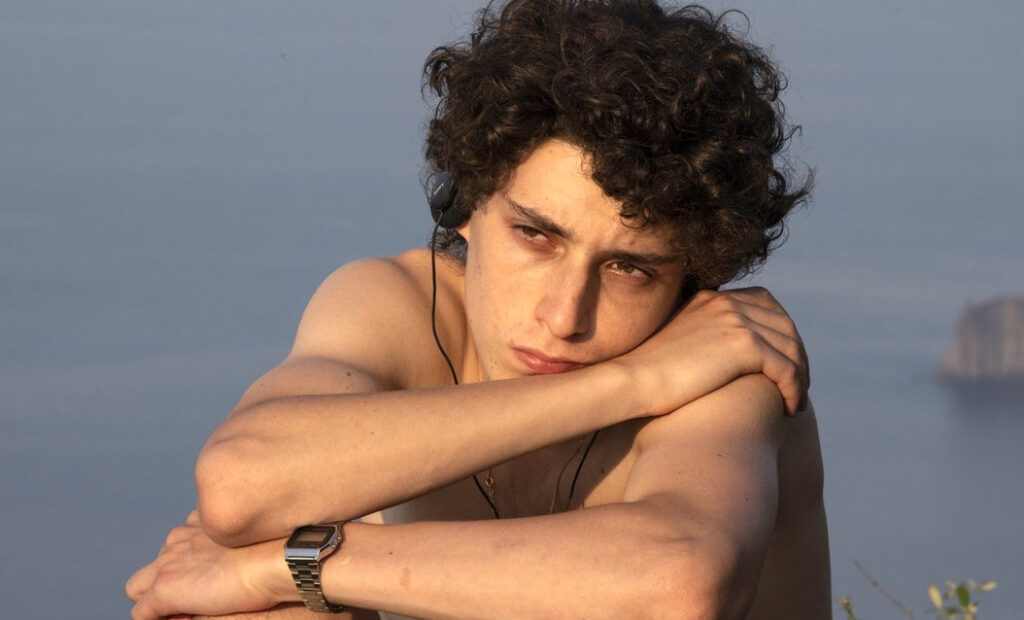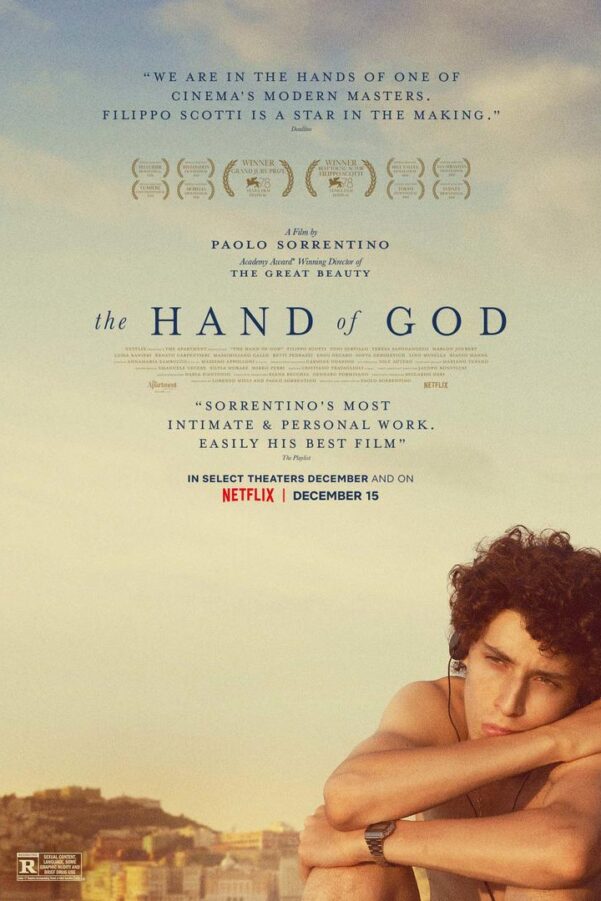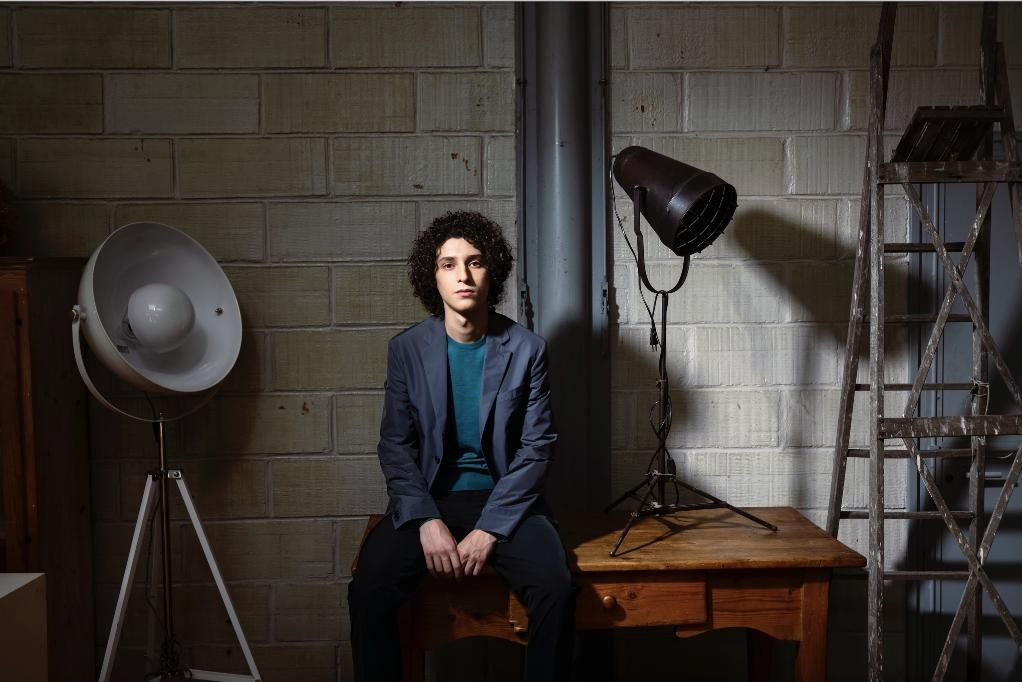“Parallels with Chalamet? We are two different people”: Filippo Scotti on The Hand of God and Paolo Sorrentino

The Hand of God is the much-anticipated semi-autobiographical coming-of-age Netflix film from Italian auteur Paolo Sorrentino. Firmly placed in the sights, smells and atmosphere of 1980s Naples, the 51-year-old director’s movie takes his audience on a trip down memory lane to relive his youth, through the lens of a fictional teenager, Fabietto, played exceptionally by 21-year-old Filippo Scotti.
Fact and fiction blur – but even if it’s through rose-tinted glasses the filmmaker sees his past, the screen version certainly doesn’t shy away from the sweat, vulgarity and, at times, violence of the family melodramas and scenarios he found himself in as an adolescent. Moviegoers are brought up close round the table with Fabietto’s extended family over languorous summer’s day lunches, crowded around the TV set when watching legendary Argentinian Diego Maradona play for the Napoli football team as though a gift from God and looking on in awe as director Federico Fellini shoots scenes for a new arthouse film in the local town.
They are also witness to both the love and toxicity, fun and abuse present in Fabietto’s parent’s marriage, the brutal treatment of his aunt who suffers from mental illness and the lessons in masculinity handed down from his father and brother – which are far from enlightened, even in the context of the 80s era.
But laying down judgement on days gone by seems far from Sorrentino’s mind. Veering away from the stylised approach of his previous films, such as the surrealist The Great Beauty, this most stripped-back movie to date seems to function more as a vehicle to recreate and enshrine the moments of the past in vivid detail, just as they were, before they evaporate forever, as well as to exorcise demons and traumas in order to move on, looking to the future with a clarity and levity of mind, much like his young protagonist Fabietto. It’s an intensely personal but simultaneously universal study of the potential-filled yet constantly disorientating experience of youth.
Not only did the The Hand of God win the Grand Jury prize at the Venice Film Festival but Scotti received the Marcello Mastroianni award, which recognises the best performance by an emerging actor, and Oscar rumours are in the air. With parallels being drawn between him and Call Me By Your Name’s Timothée Chalamet for more than just their similar locks, he’s no doubt one to watch.
The Upcoming had the privilege of speaking to the breakout star about his experience of making the film.
Hi, I’m Sarah from The Upcoming. It’s such a pleasure to be able to chat with you about this incredible film. Paolo Sorrentino is very much a revered director and this is his most autobiographical film to date, with you at the centre of it. So it must have been both an honour and an intimidating prospect to take on this role. What was the appeal for you?
Yeah, it was, as you said, intimidating. It was difficult at the beginning, especially when Paolo told me, “I want you to be the main character of the movie”. But at the same time, I tried, not to focus on Paolo’s teenage years, but on Fabietto’s teenage years. So to think about the character as a character, and not as Paolo. So thinking about that, I have to say that I really changed my perspective. And I started working better, not better as an actor, but better with myself, you know?
So how did you prepare to play Fabietto? Did you do a lot of your own research? Did you have lots of conversations with Paolo? Because there seems to be a blurring of fact and fiction, so although it’s based on memories and some real events, a lot has also been dramatised.
I spent the summer before the beginning of the shooting in Naples, while my parents were on holiday. And yeah, I did research. I text Paolo asking him what type of music Fabietto would have been listening to and what types of films he would have been watching just to build around me the environment of the Naples of the age. So I spent this month alone, the month of August when it was pretty hot in Naples, and tried to build a connection with the character. And also to do research about Maradona because I’m not a big football fan! So I had to turn on that passion that Fabietto has that I don’t. So that was a big part of the research. Then the character has his own posture. Paolo told me to watch Road to Perdition by Sam Mendes because Jude Law is walking in a particular way. So I followed that type of walking to accentuate Fabietto’s mood to be shy and not really be comfortable with his peers. So that was a bit of the work. Then we didn’t rehearse at all but read the script once with Toni, Teresa, Marlon and Paolo of course. In fact only half of the script, so we finished reading halfway through the movie. Because it was Paolo’s intention to give us the possibility – that was a pretty scary one – to go there basically and jump into the void together, to take all the electricity of the sets, all the energy of the set, to be able to take it and to put it on camera. Because of course, when you – it depends, but there are some things that if you rehearse too much when you arrive on set then it’s more difficult to make them seem as natural as you can. So we memorised the script and then we went there like this, following Paolo. Paolo is great. He’s a master, really. So it was fun. It was scary. Not Paolo, but in general, everything. But I said this is already!
You get the sense that was such a chemistry between all the actors, particularly between you and those who play your immediate family. But there are also some really challenging scenes. There’s a lot of intense emotion, a lot of melodrama. Perhaps a scene we can refer to as well is when your character loses his virginity. So what were some of the highlights and challenges of being on set with these other actors? And of course, with Paolo?
I’d say, actually, the set experience was all great. Of course, there are some scenes, as you said, that are more topical. The family one around the table was great, also because I was honoured to work with Toni, to work with Marlon, with Teresa, a lot, because we built that family atmosphere. Around that table were great actors who I grew up looking up to and then there I was playing a role alongside them and it was very strange. So I also needed to do this type of work, to unfocus on this, because I would be very distracted by them as figures, I had to think about them as actors. So that scene was great with Renato Carpentieri, with Luisa Ranieri, Massimiliano Gallo – all of them, great, great, great. So that scene for sure. I remember the hospital scene was very challenging. That was the last one that Marlon and I did, exactly the last one of all the movie. And this was very helpful, actually, to leave it as the last one. And then that Baronessa scene, the scene with the old woman, that was very intense, very intense. Also, because it’s a poetic scene. It’s not like a sex scene. It’s a poetic scene. It’s that figure that you need when you have a problem, you are in a difficult moment. And she was there, she was there to help Fabietto to see the future and to try to not be scared about it. This was very, very interesting.
What do you think it is about Paolo as a director that makes him such a master? Do you think there was something special about making this film with him? Because, in some ways, it’s much more stripped back than some of his other more stylised movies and must have been a project very close to his heart.
I think when you are going on sets and everything is organised and you are doing difficult things but you’re feeling them as easy: this is a lot. This is really a lot. And that’s why Paolo really is a master. And he’s a master first of all because you open the script and you read a masterpiece. And you laugh, you cry, you feel – literally, you feel – and this is very important because usually as an actor when you’re reading a script you need to understand specifically, “what am I thinking about when I’m saying this line?” And this was basically fluent, everything was pretty natural. And this is I think one of the best things. And Paolo is always sure of what he has to do, you’re never feeling abandoned by the director, you know? And this is not something so common, actually, unfortunately. It’s not something so common. So I think this is very important. Then, yeah, it’s a pretty different movie. But I mean, when you’re doing it – I wasn’t thinking about how it would look, no? I don’t know. You’re just there and you’re just that character or that person and you’re trying to do your best. So basically, this was the experience of these two months of shooting.
Obviously, it’s a very personal story. But there are also some universal and interesting themes that come out of it: dealing with loss, a young boy coming of age, the process of becoming an artist – because it’s out of Fabietto’s grief his desire to become an artist is born, his way of looking to the future is thinking about cinema as an escape from his reality. What do you think are some of the themes that arise out of the film?
I think for sure, as you said, it’s a movie about loss. It’s a movie about love, a love that can be difficult as between the kid’s parents, and all the love for Maradona –which is a love that changes your life, your daily basis, at least for a Neapolitan! And it’s a movie about the future. That’s very interesting because it’s a very personal story that becomes universal. So it’s a movie for everyone. But really, I thought about that just when I saw the movie, not when I was doing the movie. But I think even though there is Fabietto, who is a teenager and is representing the movie as the main character, it’s a movie for everyone, really. It’s not saying just specifically to the younger people that you don’t need to be scared about the future, but also to the older ones, you know? So this is very interesting. Yeah, it’s a personal story that is universal.
The film also captures so much that is unique, not just to Italy, but also to Naples, and to Naples in the 80s. So although there’s a lot in it Italians can probably relate to more, people from around the world can enjoy all the idiosyncrasies that make up that culture and that way of life and that way of looking at life?
I think yes. I mean, it’s set in the 80s. But actually, as Neapolitan culture, you could say that is still like that, with all the differences of the years. That tradition, that energy, that way to live the things and also that way to live the drama. Although there is not always a drama as often a drama then becomes something fun, because they want it to become something fun, just not to suffer too much. It’s a city where people are always helping each other and it’s very beautiful. I think that can be appreciated by everyone.
Watching you in the film also made me think of you as perhaps like an Italian Timothée Chalamet, also because his career was very much launched by working with an Italian director on a film based in provincial Italy. So do you see some parallels there? And how do you think this film might be the start of something amazing for your career? I saw you were listed as an actor to watch in Variety!
Yeah, I mean, I’m very honoured about that. Parallels with Timothée Chalamet? I’m not thinking about that because we are two different people. But I hope that this movie can open up ways for me to go and to live new experiences and to enjoy the work and to suffer for it, too. Because it’s important to feel very much to do this job, to wait and to be patient.
And just finally, do you have another film you’re already working on? Or do you have particular actors or directors that you would most love to work with?
Working on something else: I’m not. Directors I’d like to work with? Many, many. Alejandro González Iñárritu to Wes Anderson, Alfonso Cuarón, Julian Schnabel. I mean, really, many, many, many of them. But these are my dream expectations. I hope, I don’t know. Let’s see.
Well, thanks so much for sharing all that with us. It was such a pleasure to speak to you and congratulations on the wonderful film, best of luck for your future projects.
Thank you very much. Have a nice day.
Sarah Bradbury
The Hand of God is released in selected cinemas on 3rd December 2021 and available on Netflix from 15th December 2021.
Watch the trailer for The Hand of God here:


























Facebook
Twitter
Instagram
YouTube
RSS